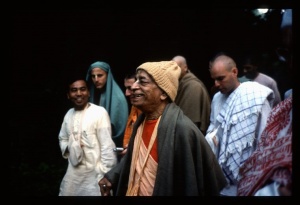SB 2.8.3

A.C. Bhaktivedanta Swami Prabhupada
TEXT 3
- kathayasva mahābhāga
- yathāham akhilātmani
- kṛṣṇe niveśya niḥsaṅgaṁ
- manas tyakṣye kalevaram
SYNONYMS
kathayasva—please continue speaking; mahābhāga—O greatly fortunate one; yathā—as much as; aham—I; akhila-ātmani—unto the Supreme Soul; kṛṣṇe—unto Lord Śrī Kṛṣṇa; niveśya—having placed; niḥsaṅgam—being freed from material qualities; manaḥ—mind; tyakṣye—may relinquish; kalevaram—body.
TRANSLATION
O greatly fortunate Śukadeva Gosvāmī, please continue narrating Śrīmad-Bhāgavatam so that I can place my mind upon the Supreme Soul, Lord Kṛṣṇa, and, being completely freed from material qualities, thus relinquish this body.
PURPORT
To be fully engaged in hearing the transcendental narration described in the text of Śrīmad-Bhāgavatam means to constantly associate with the Supreme Soul, Śrī Kṛṣṇa. And to constantly associate with the Supreme Lord Kṛṣṇa means to be liberated from the qualities of matter. Lord Kṛṣṇa is like the sun, and material contamination is like darkness. As the presence of the sun dissipates darkness, constant engagement in the association of the Lord Śrī Kṛṣṇa frees one from the contamination of the material qualities. Contamination by the material qualities is the cause of repeated birth and death, and liberation from material qualities is transcendence. Mahārāja Parīkṣit was now a realized soul by this secret of liberation, through the grace of Śukadeva Gosvāmī, for the latter had informed the King that the highest perfection of life is to be in remembrance of Nārāyaṇa at the end of life. Mahārāja Parīkṣit was destined to give up his body at the end of seven days, and thus he decided to continue remembering the Lord by His association with the topics of Śrīmad-Bhāgavatam, and thus to quit his body in full consciousness of the presence of the Lord Śrī Kṛṣṇa, the Supreme Soul.
The hearing of Śrīmad-Bhāgavatam performed by professional men is different from the transcendental hearing of Mahārāja Parīkṣit. Mahārāja Parīkṣit was a soul realized in the Absolute Truth, Śrī Kṛṣṇa, the Personality of Godhead. The fruitive materialist is not a realized soul; he wants to derive some material benefit from his so-called hearing of Śrīmad-Bhāgavatam. Undoubtedly such an audience, hearing Śrīmad-Bhāgavatam from the professional men, can derive some material benefit as they desire, but that does not mean that such a pretense of hearing Śrīmad-Bhāgavatam for a week is as good as the hearing of Mahārāja Parīkṣit.
It is the duty of the sane to hear Śrīmad-Bhāgavatam from a self-realized soul and not be duped by professional men. One should continue such hearing till the end of one's life so that one can actually have the transcendental association of the Lord and thus be liberated simply by hearing Śrīmad-Bhāgavatam.
Mahārāja Parīkṣit had already given up all his connections with his kingdom and family, the most attractive features of materialism, but still he was conscious of his material body. He wanted to be free of such bondage also by the constant association of the Lord.